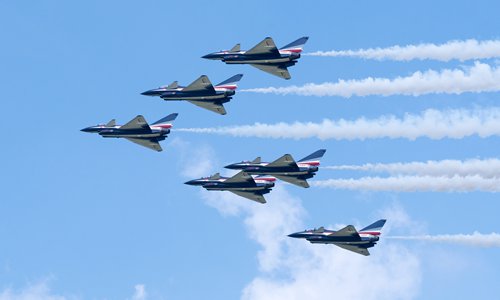HOME >> OPINION
Joint drills by 2 air forces mark historic occasion for global stability
By Li Yonghui Source:Global Times Published: 2019/7/30 20:58:40

Photo: IC
Chinese and Russian air forces on July 23 conducted their first joint aerial patrol in Northeast Asia. China deployed two H-6K bombers while Russia sent two Tu-95MS planes to fly pre-planned routes over the Sea of Japan and the East China Sea. Both air forces strictly followed international rules and did not enter the airspace of other countries during the exercise.This mission was within the annual cooperation plan between the Chinese and Russian armed forces and was not aimed at third parties. However, it drew concern from Japan, South Korea and the US. South Korea accused Russian aircraft of entering their airspace and sent fighter jets in response. The Japanese Defense Ministry also said its forces "responded by launching fighters urgently," according to reports.
The occasion marked the first time that Chinese and Russian forces conducted joint aerial operations. The two countries had previously participated in land and sea exercises, yet a joint patrol using strategic bombers and early warning aircraft in sensitive Northeast Asia regions was unprecedented.
The drills show enhanced strategic cooperation between both military forces, underlining joint strategic capabilities. The combined efforts reveal a significant manifestation of mutual trust and are a reflection of the high-level, special relationship enjoyed by China and Russia.
The operation was a highlight of military-strategic cooperation. It is also a reflection of their commitment to safeguarding global stability and peace.
In recent years the strategic partnership has developed between China and Russia. The top leaders of the two countries in June agreed to upgrade their relations to a comprehensive strategic partnership of coordination for a new era.
The goals achieved through military cooperation between China and Russia are aimed at ensuring national safety, creating favorable conditions for steady development and responding to security threats and new challenges. Meanwhile, in the new era, China and Russia are determined to deepen strategic mutual trust, strengthen strategic coordination and maintain global and regional stability.
Nowadays sound relations among major powers are necessary to solve global issues. Nuclear-weapon countries bear significant responsibilities for international security and global stability. Their concerns should be addressed through dialogue and consultation. The countries are supposed to enhance mutual trust, consolidate security and avoid strategic misunderstandings and misjudgments.
In a recently released white paper, China's National Defense in the New Era, Russia is mentioned over a dozen times. The relationship between China and Russia has developed at a high level and in line with their strategic interests. Mutual security has been the solid foundation that has allowed them to move to historic heights. In the future, military cooperation between the two will reflect how strongly they support the core interests of one another. Chinese and Russian military forces will improve exchange mechanisms at all levels and in all directions, and expand cooperation in high-level exchanges, military training, development of equipment and technology, and counter-terrorism efforts.
Close military cooperation between China and Russia is the start for the two countries to maintain geopolitical security. The Northeast Asia region is shrouded in the shadow of the Cold War. The military alliance between the US, Japan and South Korea has witnessed an increase in deployment of their military forces, especially anti-missile systems, triggering an arms race in the region, which has had a negative impact on regional security.
China and Russia on the other hand are providing positive energy in maintaining global peace and strategic stability.
The author is a research fellow in the Institute of Russia, Eastern European and Central Asian Studies at the Chinese Academy of Social Sciences. opinion@globaltimes.com.cn
Posted in: ASIAN REVIEW